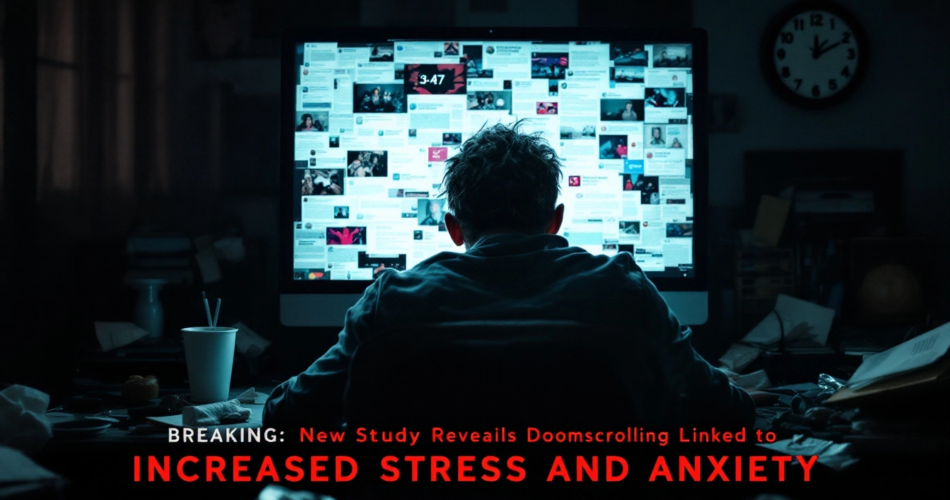Imagine this: You grab your phone to check the latest news and find yourself endlessly scrolling through negative headlines. What began as a quick glance has now consumed hours of your day, leaving you feeling anxious and overwhelmed. This behavior, known as “doomscrolling,” has become alarmingly common in the digital age. More than just a bad habit, its impact on your mental health and brain function is profound. In this article, we’ll explore doomscrolling mind effects, its toll on your well-being, and practical steps to break free from this toxic cycle.
Table of Contents
- What is Doomscrolling and Why Do We Do It?
- Psychological and Emotional Effects of Doomscrolling
- Neurological Changes Caused by Doomscrolling Mind Effects
- How to Break the Doomscrolling Habit
- Safeguarding Your Mental Health Online
- FAQs on Doomscrolling Mind Effects
What is Doomscrolling and Why Do We Do It?
Understanding Doomscrolling
Doomscrolling refers to the compulsive habit of endlessly scrolling through streams of negative news, particularly on social media or news websites. From political unrest to global pandemics, the internet provides an unlimited supply of distressing headlines—enough to keep you tethered to your device.
The Role of Fear and Uncertainty
Human psychology plays a significant role in why doomscrolling feels irresistible. Fear and uncertainty activate a primal survival instinct, urging us to seek additional information to regain a sense of control. Unfortunately, modern algorithms exploit this tendency by feeding us more negative content, creating a vicious cycle. Studies on negative media effects confirm that people are naturally drawn to emotionally charged content, even when it’s harmful to their mental health.
Psychological and Emotional Effects of Doomscrolling
Increased Anxiety and Depression
It’s no surprise that consuming a steady diet of alarming news can take a toll on your mental health. Prolonged exposure to negative content amplifies feelings of hopelessness and helplessness, contributing to increased levels of anxiety and depression. This emotional weight reduces your ability to process events objectively, keeping you trapped in a loop of mental distress.
Impaired Focus and Productivity
The effects of doomscrolling extend beyond mood—it also affects your ability to focus. Constant notifications and the emotional strain of bad news can overload your cognitive capacity, making it harder to concentrate on work or connect with loved ones meaningfully. Tasks that once felt simple become draining, creating frustration and a sense of diminished productivity.
Neurological Changes Caused by Doomscrolling Mind Effects
Changes in Brain Chemistry
Doomscrolling isn’t just bad for your mental health—it alters your brain’s chemistry too. Research suggests excessive consumption of negative news elevates stress hormones like cortisol while activating the brain’s reward system through dopamine. This combination creates a hazardous feedback loop, where the fleeting dopamine rush rewards you for seeking more harmful content. Learn more about stress and the brain.
Sleep Disruption and Long-Term Brain Health
Late-night scrolling is particularly destructive to your brain. Blue light from screens interferes with melatonin production, disrupting your circadian rhythms. Over time, poor sleep and chronic stress can increase risks for cognitive decline, memory issues, and even conditions like dementia. Protecting your brain starts with rethinking how you engage with digital content, especially before bed.
How to Break the Doomscrolling Habit
Setting Healthy Digital Boundaries
A structured approach to online behavior can mitigate doomscrolling’s effects. For example, you can:
- Schedule time blocks for social media and news consumption.
- Use apps to monitor and limit screen time.
- Establish a “digital curfew” to avoid late-night scrolling.
Small changes like these can prevent doomscrolling from dominating your day.
Replacing Negative Habits with Positive Ones
Breaking a bad habit is easier when you substitute it with healthy alternatives. Instead of diving into negative news, try activities that promote relaxation and positivity, such as meditation, journaling, or reading inspiring content. Having go-to alternatives can help you redirect your attention and create more balance in your life.
Safeguarding Your Mental Health Online
Curating Your Online Environment
You can take control of the content you consume. Filtering your news sources, following uplifting social media accounts, and unsubscribing from sensationalist outlets are practical steps. By carefully curating your digital environment, you reduce unnecessary exposure to harmful content.
Seeking Professional Support
Sometimes, doomscrolling might point to deeper concerns like chronic anxiety or depression. If you find it difficult to stop despite repeated efforts, consider seeking professional help. Therapy or other mental health resources can offer tailored strategies to address your challenges effectively.
Frequently Asked Questions
What are the main doomscrolling mind effects on mental health?
Doomscrolling negatively impacts mental health by increasing anxiety, depression, and feelings of helplessness. It can also impair focus and productivity.
Is doomscrolling an addiction, and how do you recognize it?
While not classified as a clinical addiction, doomscrolling exhibits addictive behaviors like compulsivity and the inability to stop despite negative consequences. Signs include neglecting responsibilities, poor sleep quality, and persistent worry.
Are there apps or tools to help stop doomscrolling behaviors?
Yes, apps like Moment, Screen Time, and Forest can help you track and reduce screen time. Browser extensions can also limit access to specific sites or lock screens during certain hours.
Why does bad news attract us more than good news?
Humans have a negativity bias, meaning our brains are wired to pay greater attention to potential threats. This evolutionary trait, combined with sensationalized media, magnifies this effect.
Can replacing doomscrolling really improve mental health?
Absolutely. Replacing doomscrolling with positive practices like journaling, exercise, or guided meditation has been shown to significantly improve mental well-being over time.
Conclusion
Doomscrolling is more than just an annoying habit—it’s a harmful cycle with serious consequences for your mental health and brain function. By understanding doomscrolling mind effects and adopting healthier habits, you can protect your well-being and regain control over your digital life. Start by setting boundaries, replacing negative routines, and curating a more positive online environment. Small but consistent changes can make a world of difference. Take the first step today and reflect on your digital habits—your mind will thank you!


